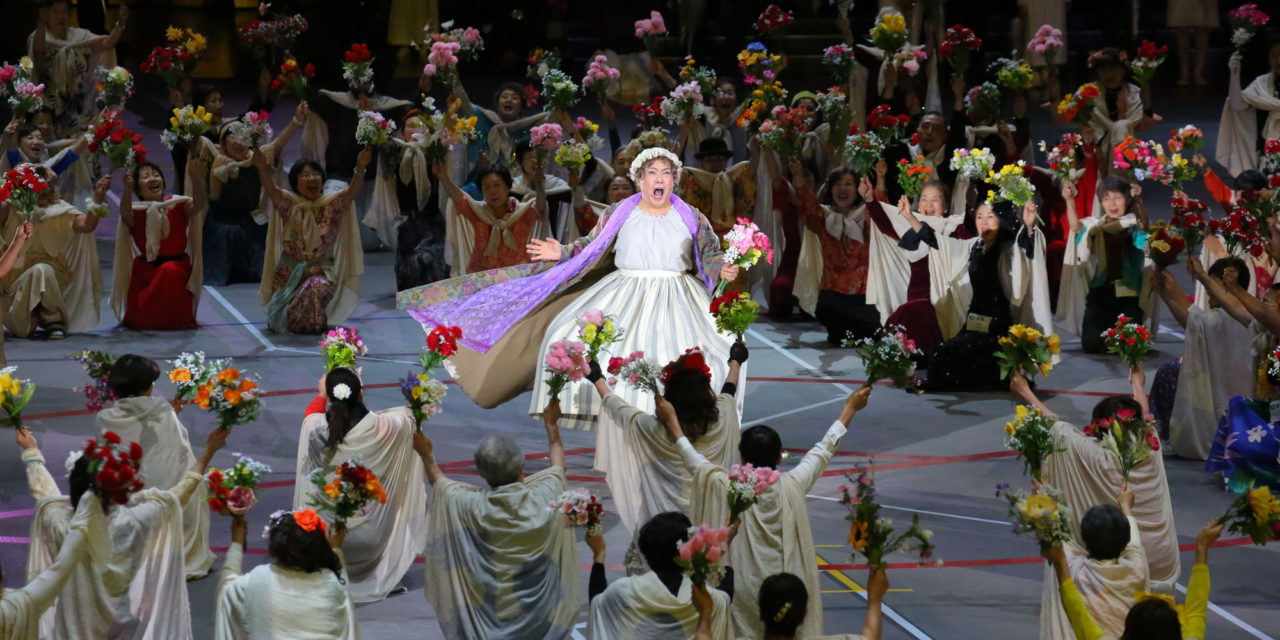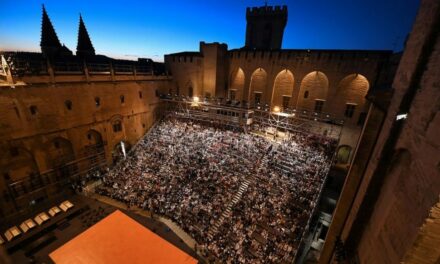At the age of 91, Saitama resident Izumi Noguchi is speaking at his first press conference — at least as an actor anyway.
“When I saw an advert in April inviting anyone aged 60 or older to audition for a new project called 10,000 Gold Theater, I just felt like challenging myself to do something I’d never had a chance to try before,” he says.
Noguchi is the oldest person who joined the 10,000 Gold Theater ensemble, which debuted the production Gold Symphony, my dream, your dream at Saitama Super Arena in Saitama City on Dec. 7.
It was a staging on an unparalleled scale that featured some 1,600 performers (not 10,000 as the name suggests) who were all volunteers and almost all amateurs. The Saitama show featured dancing, singing and a plot roughly based on Shakespeare’s Romeo and Juliet.
Arts promoter, Taneo Kato came up with the idea for 10,000 Gold Theater when he had a “flash of inspiration” four years ago. He was watching a performance of Hamlet in which stage icon Yukio Ninagawa directed members of the Saitama Gold Theater and Saitama Next Theater — troupes made up of older and younger actors that he formed in 2006 and 2009, respectively, after becoming artistic director at Saitama Arts Theater in 2006.
“Out of the blue, midway through Hamlet, veteran enka singers the Komadori Sisters — who are actually twins — appeared and sang “I Want to be Happy One Day,” ” Kato says, recalling how striking a moment it was to see the women, born in 1938, sing those words. “And right then I realized that just as young Hamlet wished to be happy, the elderly do, too. So I thought we should create more opportunities for seniors. I asked Ninagawa to start another new Gold Theater.”
In fact, when Ninagawa took up his appointment at Saitama Arts Theater in 2006, one of his primary goals was to “create a place that can be enjoyed and loved by our local people … (so) we need to entice our neighbors to come and see for themselves what’s happening at the theater.”
Only a few months after that, he founded Saitama Gold Theater and held an open audition for people aged 55 and over, from whom he chose 48 for the troupe — there are now 38, with an average age of 77. Although he conceived it to stage one particular work, word of the troupe spread and they soon found themselves doing more shows and earning praise from critics, both domestically and abroad.
At the press conference, Kate Organ, an English arts adviser for the elderly, reinforces the troupe’s reputation.
“Gold Theater is a very rare and special case of the arts by oldies. Last year I saw Richard II, in which Gold and Next members worked together, and that was amazing,” she says. “In today’s fast-graying world, I think it’s very important for generations to mix and not become separated from each other.”
Ninagawa added hundreds more performers (three-quarters of them women) to Saitama Gold Theater to create 10,000 Gold Theater. Sadly, however, the new actors were to be denied the chance of being directed by him, following his sudden death in May this year.
Taking his place is Seiji Nozoe — the 41-year-old author, director, actor and playwright of Gold Symphony, my dream, your dream. Though he only met Ninagawa once, he says that he was emboldened to shoulder the direction because, on that occasion, Ninagawa said to him specifically that he looked forward to reading his play.
The Saitama Arts Theater was a hive of activity weeks before opening night. The huge cast was divided into groups, and around 100 elderly actors were practicing the famous balcony scene from Romeo and Juliet in which the titular pair confess their love for one another. Various supposedly besotted combinations testified one after another. Sometimes, of course, true love doesn’t run smoothly. Pairs mistakenly shouted out their lines at the same time, and others took to performing improvised gestures and dances to lure their would-be lovers. And, yes, the room was often filled with laughter.
Nonetheless, Nozoe moved around calmly doling out praise one moment and seizing the reins of direction another. The actors hung on his every word and take on his suggestions amazingly fast.
As all this was happening, the young members of Next Theater were mixing with the seniors to help them with their physical movements and learning the cues for their lines.
“I’ve come from Kyoto to join this 10,000 Gold Theater project, and every time I find some new discovery and that’s such great fun,” says one burgeoning actress with a heavily bandaged shoulder. She added with a smile and a laugh that “even though I need an operation, I will have it in Kyoto after Dec. 7.”
Directing such a large group of beginners would likely drive many people nuts, but Nozoe is very patient.
“People tend to categorize others by their age and gender and condition, and many would simply dismiss these people as ‘over-60s,’ ” he says. “Actually, they each have their precious individuality and everybody is different. It’s very challenging, but I try to keep that firmly in mind at every moment.”
Having been brought up in the United States until he was 8, his family then moved back to Okayama. Nozoe went to Tokyo for university and then formed his own theater company, Haegiwa (Hairline), in 1999 while still in his mid-20s. He may not be so old, but he does have valuable experience — most notably from being involved since 2010 in a Setagaya Public Theatre outreach program in which he has visited dozens of elderly care homes to present original short plays.
“I was nervous to begin with,” he says, “but the old people, some of whom have dementia, laugh and clap so freely and react so openly that it was actually the first time I’d shed tears because of an audience’s reaction. That is a powerful reminder of the power of theater and how, rather than my artistic self-satisfaction, it’s more important to make the audience enjoy the play.”
As for Romeo and Juliet being the fatal love story of a young couple far removed in age from his current cast, Nozoe said he believes people of any generation can experience feelings of love, enmity, and jealousy — and “mature” actors often add “a more colorful human tone and scent.”
“I always remind them to be their own Romeo, or Juliet, and not to copy someone else,” Nozoe said. “But I don’t really care about their acting technique. I’d rather let them freely express their 60-plus years of life history on stage and create 1,600 different types of Romeos and Juliets if that’s what happens. I suppose some mistakes will occur on the day of the performance, but I will accept that because it’s an important part of this project.”
Nozoe’s words are reminiscent of something Ninagawa said some years ago: “Old people are not angels. They assert themselves strongly so a lot of the procedure of the work is to integrate those self-assertions. It’s like a fighting sport, but that’s why it’s very interesting,” he said. “In the end, their acting really draws on their long history, so their performances can be unforgettable.”
Gold Symphony, my dream, your dream was performed at Saitama Super Arena in Chuo-ku, Saitama City, on Dec. 7 at 3 p.m. For more information, visit www.saf.or.jp.
This post was originally posted at TheJapanTimes.com. Reposted with the permission of the author.
This post was written by the author in their personal capacity.The opinions expressed in this article are the author’s own and do not reflect the view of The Theatre Times, their staff or collaborators.
This post was written by Nobuko Tanaka.
The views expressed here belong to the author and do not necessarily reflect our views and opinions.


















